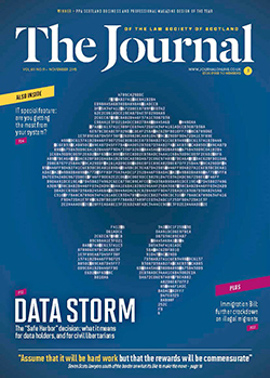Opinion: David Faith

The first week of November each year is Living Wage Week. The week is a celebration of the living wage movement and the employers who have signed up by becoming accredited Living Wage Employers.
The movement is growing in Scotland faster than anywhere else in the UK, and there are now over 370 accredited Living Wage Employers based in Scotland (scottishlivingwage.org/accredited). As someone who trained as a solicitor, I’m particularly pleased to see the number of employers in the legal sector – including the Law Society of Scotland – who have already signed up. So, in the spirit of Living Wage Week, I would like to congratulate those employers who have already become accredited, and encourage more to consider doing the same.
Before looking at the legal sector specifically, some general background might be helpful. The living wage is an hourly rate of income which employers can choose to commit to paying, as a minimum, to all their staff and on-site contractors. The rate is calculated independently and updated annually, and is defined as the amount of money needed to enjoy a basic, but socially acceptable standard of living. The new rate in Scotland is £8.25.
Why do we need a living wage at all? Well, for the first time, the majority of people in poverty in Scotland are living in households where at least one person is in work. The market has failed to keep up with the cost of living, and the lowest paid have suffered from a “double squeeze” of stagnating pay and rising expenses. The living wage allows access to those goods and services most people would consider necessary to participate in society.
It’s important to remember, however, that as well as the many social benefits, there is a business case for the living wage. Independent research for the University of Strathclyde has shown that the living wage improves morale, productivity and the ability to recruit fresh talent whilst at the same time reducing absenteeism and staff turnover.
Accreditation takes commitment to the living wage one step further and works as a formal recognition scheme. Accredited employers have the right to use the Living Wage Employer mark and are listed publicly on our website and on the Living Wage Foundation’s website. Accreditation signals that an organisation is a responsible employer and part of the living wage movement.
Here’s what some of the accredited employers in the legal sector in Scotland had to say about living wage accreditation:
“Munro & Noble views accreditation as a Living Wage Employer as part of our social responsibility. This responsibility is not only to our staff, but also to our community and our profession. All our staff, particularly our non-qualified service and support staff, can have confidence that we will provide them with a fair and reasonable salary for their services. By setting an example to our fellow Highland employers and the wider legal profession, I sincerely hope that others will join the cause in assisting the lower paid members of society to achieve a fair standard of living. For the low paid, the difference between the minimum wage and the living wage is to satisfy basic needs, including self-esteem.” (Gordon McIntosh, practice manager, Munro & Noble)
“We are delighted to support the living wage and to have received accreditation. Paying all our employees fairly for the valuable work they do is very important to us.” (Derek Cummings, HR & operations director, Burness Paull LLP)
“As well as making good business sense, the living wage is morally right. Staff feeling genuinely valued and appreciated is part of the ethos of our firm and we understand it is fundamental to our business. Ensuring staff are paid enough to enjoy a comfortable lifestyle in turn creates a loyal workforce and an excellent team.” (Elaine Motion, chairman, Balfour + Manson LLP)
“When we learned of the living wage initiative we thought it was very worthwhile and something that the firm and staff would want to identify with. We already do a lot and have won awards for contribution to the community, so it seemed a good fit to align with the living wage. We were delighted to make some adjustment, mainly involving contractors, and become the first law firm in Scotland to be accredited.” (Neil MacInnes, director of HR, Digby Brown LLP)
We would be delighted if more employers were able to use their influence and show real leadership in the legal sector, in their communities and in the wider business world by becoming accredited as a Living Wage Employer. If your organisation is interested in finding out whether accreditation might be right for you, please get in touch.
David Faith is living wage accreditation officer at The Poverty Alliance
e: david.faith@povertyalliance.org
t: 0141 353 0440
w: scottishlivingwage.org
In this issue
- Appropriate adults and defence agents: who does what?
- Buying from a housing association: why consent matters
- Harassment: a civil claim?
- A welcome abroad: EYBA in London
- Reading for pleasure
- Opinion: David Faith
- Book reviews
- Profile
- President's column
- ScotLIS gets the green light
- People on the move
- Storm over Safe Harbor
- Light on a murky world
- Southern horizons
- Mediation minefield
- Migrants: no way to turn?
- The technological edge
- As our suppliers see us
- More rules to grapple with
- Fraud and divorce – a Scottish Sharland?
- What future for employment tribunal fees?
- Heading for a showdown on hard won human rights?
- Taxing question of relief
- Scottish Solicitors Discipline Tribunal
- How far can we rely on the register?
- All part of the game
- Law reform roundup
- From the Brussels office
- Poverty: a new front in the war
- Damage limitation: working it out
- Ask Ash
- A lawyer's lament
- Appreciation: Michael Scanlan






